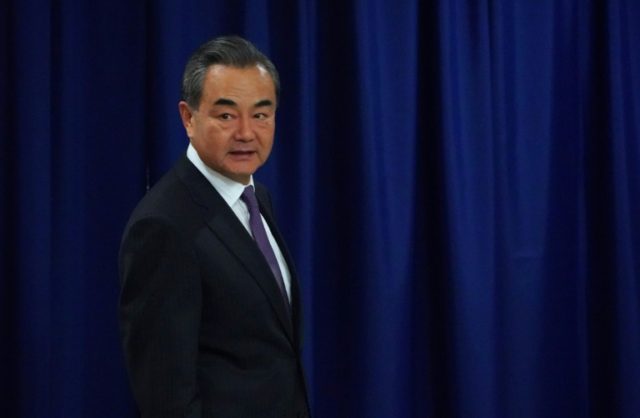China will establish a contact group through the Beijing-led Eurasian coalition known as the Shanghai Cooperation Organization (SCO) to help “speed up” U.S.-backed efforts to end the more than 17-year-old war in Afghanistan with a political reconciliation between Kabul and the Taliban, the Chinese foreign minister said this week.
During a meeting with his Kyrgyz counterpart Chingiz Aidarbekov in Beijing on Thursday, China’s Foreign Minister Wang Yi declared, “We will make the SCO Afghanistan contact group to play a better role so we can speed up the political settlement of Afghanistan internal issues,” Afghanistan’s TOLO News reports.
Beijing has come out in support of intensified U.S. efforts towards a negotiated political settlement in Afghanistan, calling for the Taliban to play a “legitimate role” in Afghan politics.
U.S. President Donald Trump’s administration has made the reconciliation between Kabul and the Afghan Taliban the primary goal of its strategy to end the war. Trump officials have expressed support for Kabul’s offer to the Taliban of official recognition as a legitimate political group, a move that would grant the terrorist group the opportunity to return to power.
Soon after invading Afghanistan in the wake of the 9/11 attacks, U.S. troops ousted the Taliban regime.
Now, the Taliban controls or contests about 45 percent of Afghanistan’s districts, more than during any other time since it was removed from power.
The Pentagon has acknowledged that the Chinese military is operating inside Afghanistan.
Beijing has expressed concerns about the presence of Chinese Uighur (or Uyghur) jihadis in Afghanistan, which shares a border with China.
While the U.S. urged cooperation with Beijing in Afghanistan in early 2018, the United States early this year cautioned that China is seeking to expand its influence in Afghanistan.
Troops from India and its regional rival China appear to be preparing for potential consequences from a possible U.S. military withdrawal from Afghanistan stemming from peace negotiations between the Taliban and the United States.
President Trump has indicated he is considering withdrawing some troops in exchange for a peace deal, but the Pentagon insists it has not received any official orders to pull out.
Last month, the United States and the Taliban “agreed, in principle, to a framework for a deal, under which the United States would withdraw troops from Afghanistan, and the Taliban would guarantee that Afghanistan does not harbor terrorists,” including its ally al-Qaeda and rival the Islamic State (ISIS/ISIL), the Pentagon inspector general acknowledged this week.
For years, the Pentagon has described America’s mission in Afghanistan as preventing the country “from becoming a safe-haven from which terrorist groups can plan and execute attacks against the U.S. homeland, U.S. citizens, and our interests and allies abroad.”
Despite U.S. military claims that the Taliban is distancing itself from the international terrorist group, an estimated 200 al-Qaeda jihadis continue to operate through cells in Taliban-controlled areas along the Pakistan border, the watchdog found.
The primary hurdle to a peace agreement remains the Taliban’s reluctance to allow the Afghan government to participate in the talks, arguing that it is an American “puppet.”
Last year, high-ranking U.S. military officials admitted that the United States would not achieve a military victory in Afghanistan.
Several peace-seeking efforts in Afghanistan have failed in recent years.
As part of the Quadrilateral Coordination Group (QCG) that also included the United States, Afghanistan, and Pakistan, China played a role in failed efforts in recent years to convince the Taliban to engage in face-to-face peace talks with U.S.-backed Kabul.

COMMENTS
Please let us know if you're having issues with commenting.